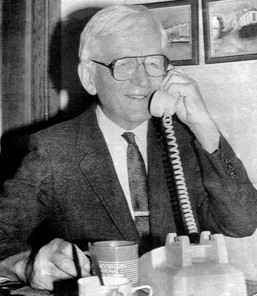Norman Ramsey, who shared the 1989 Nobel Prize in physics for his research into atomic energy levels that led to the creation of the atomic clock and MRI machines, has died. He was 96. Ramsey died in his sleep at a Wayland nursing home on Friday.Ramsey, an emeritus professor of physics at Harvard University and longtime Brookline resident, wrote in his autobiography for the Nobel Prize he shared with Hans Dehmelt and Wolfgang Paul that he was inspired by failure in molecular beam magnetic resonance experiments in the late 1940s to invent a new technique of measuring the frequency of radiation from atoms using two electromagnetic fields. The technique is known as the “separated oscillatory fields method,” or more informally among physicists, the Ramsey method.Since 1967, the cesium atomic clock second has been defined as the time during which the cesium atom makes 9,192,631,770 oscillations.Learn more from the Washington Post.
Nobel Prize-Winning Physicist Dies at 96






